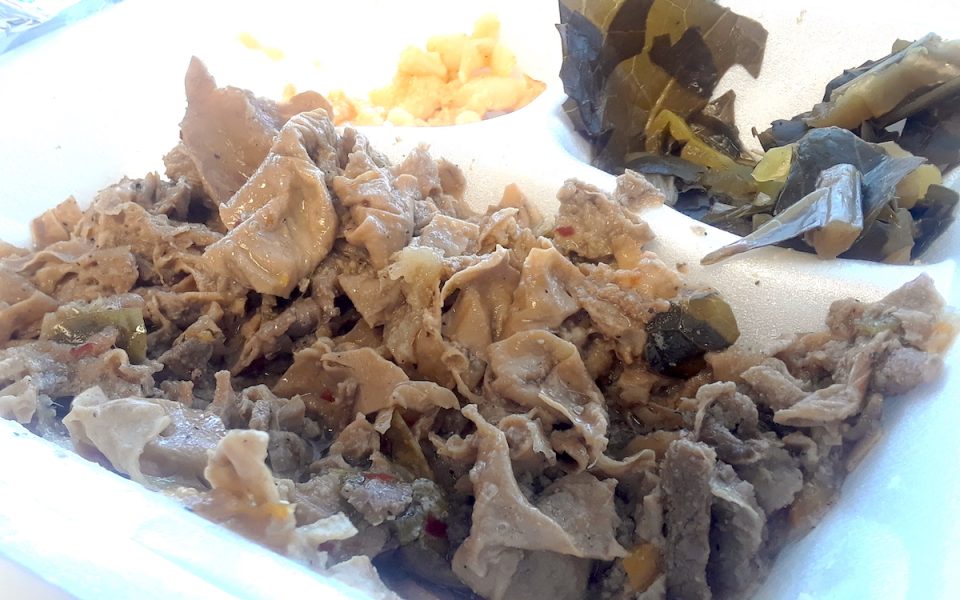It’s killing season.
For hogs, that is.
As a great-granddaughter of a farmer, I’m two generations removed from picking crops, plowing fields, missing school for harvest season or helping butcher farm animals for dinner and putting them up for the winter. I’m so removed from the process that, while dining out recently, I made an insensitive comment about the fabrication skills of the house fishmonger when a bone lodged itself in my throat. I actually forgot fish have bones.
My refined palate and my current diet frequently take me on a road where meat and fish arrive with nary a sign of skin nor hair before and after cooking. I am so used to seeing perfect cuts of meat with uniformly marbled fats swirling behind windows of cellophane and plastic wrap in the grocery store; perfectly cut strips of bacon that wave like a flag in the refrigerated section and ground pork sausage molded into the shape of a pig with cherry tomatoes for eyes that decorate the butcher’s display case.
Living in 2019, we are somewhat disconnected as a society from how the food gets from the farm to the table. Tradition and novelty meet somewhere in the middle when it comes to offal meats. Whether it’s a delicacy, specialty item or seasonal on a restaurant menu, the way we see (and eat) offal is different.
I used to say, “There’s a reason why they call if offal,” but no longer.
While foie gras (goose or duck liver), pâté (potted meat or rillettes) and sweetbreads (thymus gland or pancreas) are regarded as delicacies, other, less glamorous parts of the animal remain standards in traditional regional cuisine and are often consumed in connection with holidays or special occasion.
These are the most polarizing parts of animals. Either you love them or you hate them. There is no in between. Which brings me to chitterlings.
I have a vague memory of my grandmother boiling chitterlings for a holiday meal. The acrid and putrid aroma relegated me to the back of the house where I could get away from the funky stench of hot feces. I’d point and laugh at the buckets of frozen chitterlings at the store and silently pray my grandmother would leave them be.
The small intestines of pigs are not easy to come by. Not only must they be cleaned, there is a thin, yet tough membrane that has to be peeled away from the lining before being chopped and boiled for up to eight hours in seasoned water. Its origins came from days of slavery. Overseers and plantation owners would keep the bacon, pork chops, loins and roasts of pork for themselves and toss the undesirable parts to the slaves like pig’s feet, ears, tails, brains and intestines.
Testicles, livers, gizzards, kidneys, tongues and skin are included in that modern elite offal category. The intestines or chitterlings (pronounced CHIT-linz) are the most interesting of the bunch — the small intestines of hogs.
And I have to admit: I never had chitterlings until last week.

Presented in a Styrofoam container accompanied by vinegary collard greens (to cut the fat of meat), macaroni and cheese (to offer comfort if the meat was not palatable) and sweet, yellow cornbread, the chitterlings looked like nothing more than chopped Steakumms at Dr. Chops in Winston-Salem. Mixed with red and green bell peppers, onions, garlic, crushed red pepper flakes, a hint of apple cider vinegar and a heavy hand of ground black pepper, the chitterlings blew me away with how good they were. The plate had the flavor of a house-spiced breakfast sausage with a light funk of boar taint. Eating it between bites of collards and cornbread gave me a minute to opine about other strange yet delicious meats I might be missing out on due to social stigma or lack of desire.
Once, I was proud to boast that I’d never eaten chitterlings. Now, I’m embarrassed to have gone so long without trying them. Next on the list: pickled pig feet and blood sausages. I think my grandmother would be proud.
Try the chitterlings at Dr. Chops Soul Food Café in Winston-Salem located at 4830 Old Rural Hall Rd. Find the full menu online here.
Join the First Amendment Society, a membership that goes directly to funding TCB‘s newsroom.
We believe that reporting can save the world.
The TCB First Amendment Society recognizes the vital role of a free, unfettered press with a bundling of local experiences designed to build community, and unique engagements with our newsroom that will help you understand, and shape, local journalism’s critical role in uplifting the people in our cities.
All revenue goes directly into the newsroom as reporters’ salaries and freelance commissions.


Leave a Reply